Welcome back to This Week in Apps, the weekly TechCrunch series that recaps the latest in mobile OS news, mobile applications and the overall app economy.
The app industry continues to grow, with a record 218 billion downloads and $143 billion in global consumer spend in 2020. Consumers last year also spent 3.5 trillion minutes using apps on Android devices alone. And in the U.S., app usage surged ahead of the time spent watching live TV. Currently, the average American watches 3.7 hours of live TV per day, but now spends four hours per day on their mobile devices.
Apps aren’t just a way to pass idle hours — they’re also a big business. In 2019, mobile-first companies had a combined $544 billion valuation, 6.5x higher than those without a mobile focus. In 2020, investors poured $73 billion in capital into mobile companies — a figure that’s up 27% year-over-year.
This Week in Apps offers a way to keep up with this fast-moving industry in one place with the latest from the world of apps, including news, updates, startup fundings, mergers and acquisitions, and suggestions about new apps and games to try, too.
Do you want This Week in Apps in your inbox every Saturday? Sign up here: techcrunch.com/newsletters
Top Stories
Winners from the Facebook outage
When Facebook went down for nearly six hours on Monday, other apps saw an immediate benefit. Telegram, for example, gained a massive influx of 70 million more users, it said. Other firms did a fuller analysis of how the outage played out in the world of mobile apps.
According to Sensor Tower, Snapchat saw the biggest increase on the social media front, with average time spent by existing users climbing by 23% week-over-week. Twitter, which had jokingly tweeted “hello literally everyone,” grew that figure by 11% and TikTok saw a 2% jump. When comparing October 4 to the week-ago day, Snapchat saw a 14% increase in sessions, the report said. Twitter saw 5% session growth week-over-week, but TikTok saw a 1% dip.
But as the outage impacted more than just social networking — Facebook’s communication services, including Messenger and WhatsApp went down, too — rival chat apps also saw some gains. This included a 15% time-spent bump in Signal and an 18% increase in Telegram. In terms of sessions, Signal and Telegram grew by 13% and 9%, respectively, when compared with September 27. In addition, both saw an increase in installs, with Signal seeing nearly 12x the installs from the day before, reaching 881,000 downloads on the day of the outage. Telegram saw 6.3 million installs and Viber gained 137,000.
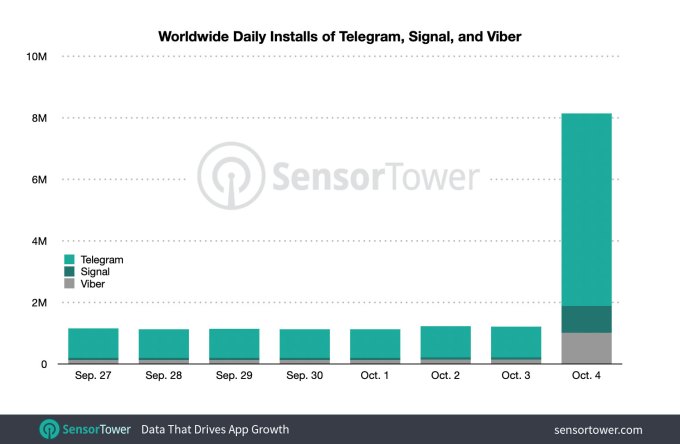
Image Credits: Sensor Tower
At Facebook, the declines in time spent were significant. Instagram’s average time spent on Android dropped by 28% week-over-week. Facebook on Android was down 24%; WhatsApp was down 25%; and Messenger was down 20%.
Apple brings back the App Store’s “Report a Problem” feature
Apple made a change to its App Store by returning the “Report a Problem” link to App Store product pages across iOS 15, iPadOS 15 and macOS Monterey devices. The link offers an easy way for users to report issues they’re having with an app, including whether it contains offensive or illegal content, or whether it was attempting to scam consumers out of their money. Apple had removed the consumer-friendly “Report a Problem” button from the App Store years ago, possibly to its detriment. New reports have suggested that many of the top apps are scams costing consumers millions and Apple has even been questioned by Congress over the situation.
The “new” feature is currently available in the U.S., Canada, Australia and New Zealand, and will make its way to other markets over time. However, the feature isn’t technically “new” in the sense that it had never before existed on the App Store — a button like this used to have a prominent position in the App Store’s early days.
When clicked, consumers will be able to select from options like “Report a scam or fraud” and “Report offensive, abusive, or illegal content” at reportaproblem.apple.com. They will also be able to report issues with free apps that don’t include in-app purchases.
The addition arrives after a number of reports about high-profile App Store scams have made headlines. Scams were even brought up in an antitrust hearing Apple attended earlier this year, when senators questioned why it wasn’t doing enough to protect consumers. The return of the button seems to be the closest to an acknowledgment we will get from Apple that fighting fraud effectively may require public input.
Apple’s apps get rated and reviewed
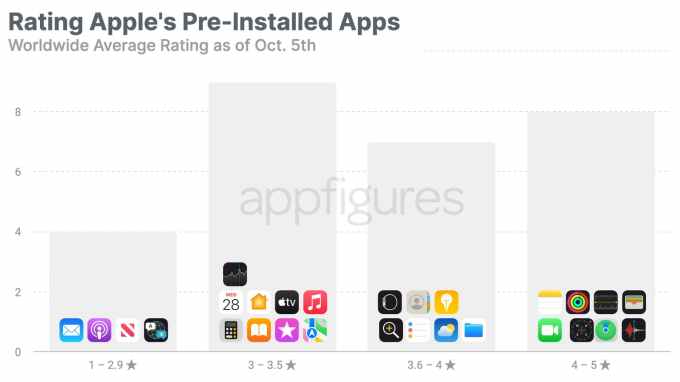
Image Credits: Appfigures
With iOS 15, Apple began to allow consumers to rate and review its own first-party apps on the App Store for the first time. That meant users could now leave reviews for built-in apps like Mail, Music, Stocks, Calculator and others that typically ship with the iPhone. Initially, some of the apps were not faring well as users finally had a chance to offer their feedback. For example, News started off with 2.5 stars as users complained about nags to upgrade to News+, advertising and other elements.
This week, Appfigures analyzed how the apps were doing as of October 5, 2021, to reflect the nearly 33,000 ratings they received over the first couple of weeks. It found that the most disliked apps included Mail, Podcasts, News and Translate. The latter, a newer app in the Apple lineup, fared the worst. Translate was the lowest-rated app, with a 2.42 average star rating globally off of 1,629 total ratings, Appfigures found. News, Mail and Podcasts were rated 2.55 stars, 2.98 stars and 2.44 stars, respectively.
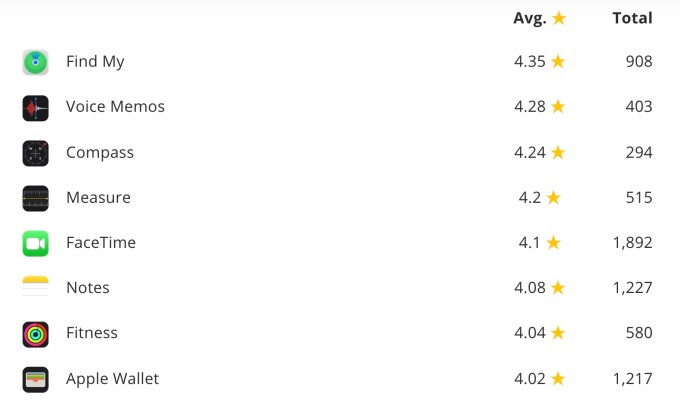
Image Credits: Appfigures
Meanwhile, apps with ratings over 4 stars included Find My, Voice Memos, Compass, Measure, FaceTime, Notes, Fitness and Apple Wallet. A majority of Apple’s apps, however, were in the 3-star range. None received 5 stars or less than 2.42.
In terms of the number of ratings, Music and Maps led with 23% of the 32,953 ratings that came in over the past couple of weeks. Worldwide, music had 4,431 ratings, and Maps had 3,207 ratings. They were also the only apps with 3,000+ total ratings as of the time of publication.
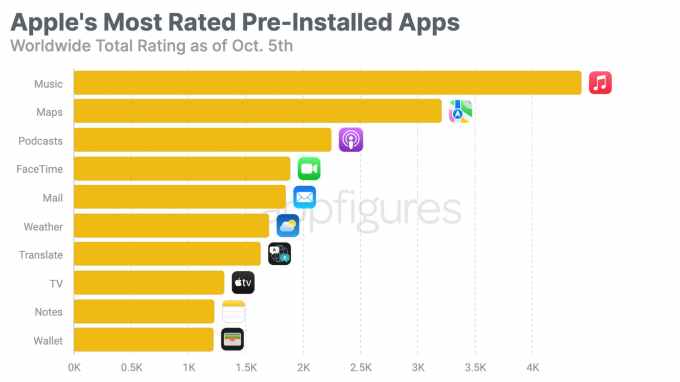
Image Credits: Appfigures
Weekly News
iOS Updates
- iOS 15 users noticed they have started to see promotions for Apple’s services in the Settings screen. While Apple has used this spot in the past, Epic Games CEO Tim Sweeney this week called out Apple for the practice, saying Apple is using the Settings screen as an ad unit its competitors don’t have access to. Apple was seen marketing Apple Music here, for example — but a rival like Spotify would not be able to use this same prime real estate in the same way.
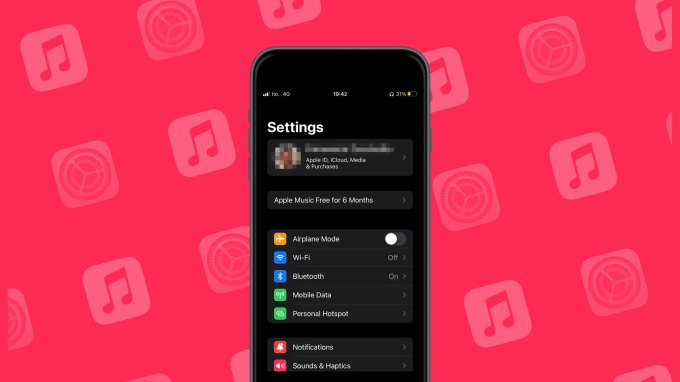
Image Credits: TechCrunch
- Apple launched new metrics in App Analytics. The new analytics include redownloads, total downloads, proceeds, preorders and updates. Each metric can be displayed by territory, source type, device and more.
- Apple reminded developers that its updated App Store Guidelines said that all app submissions starting January 31, 2022 will need to offer an account deletion feature if they also offer account creation. The changes were previously announced alongside other, larger updates focused on cutting down on fraud and scams.
- Apple launched iOS 15.1 beta 3, which added a new “Auto Macro” toggle that will allow you to disable the automatic camera switching. It also added ProRes support and fixed some of the issues with Apple Maps’ “Look Around” mode’s image quality. Meanwhile, Apple stopped code signing iOS 14.8 for some older iPhones.
- Apple launched new coding guides for elementary school students. The guides include a new one-hour App Design session and other core coding concepts.
Android updates
- Google announced its next Pixel event would take place on October 19. The company said it will officially introduce the Pixel 6 and Pixel 6 Pro, powered by its first custom mobile chip, Tensor.
- Google released the Android 12 source code on Android Open Source Project (AOSP). But unlike in years past, it didn’t also immediately release the new OS to Android devices. Instead, it said that Pixel device owners will still need to wait a few more weeks for some Pixel-first exclusives and features. (Perhaps to be announced at the new event?) Android 12 will also reach other phones later this year, including Samsung Galaxy, OnePlus, Oppo, Realme, Tecno, Vivo and Xiaomi devices.
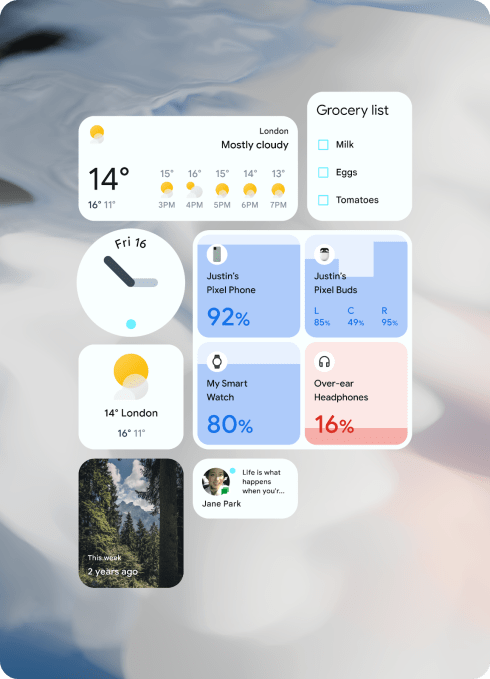
Image Credits: Google
E-commerce
- Pinterest rolled out new features for advertisers and brands to promote their products to users on its platform. A new “slideshow for collections” feature pulls products from brands’ catalogs and automatically turns them into a “collections ad,” which helps advertisers produce video-like content. It’s also adding support for “merchant details,” which will allow brands to showcase their values — like “responsibly sourced” and “inclusive” — on their profile. And companies can highlight communities they’re a part of, like “women-owned” or “Black-owned,” for example. The company is also expanding its Verified Merchant Program and is testing a new “Idea Ads with paid partnership” feature that is a joint partnership between creators and advertisers.
- U.S. consumers are expected to spend over 900 million hours on mobile shopping apps during the holiday season, reports App Annie. This figure is up 20% year-over-year in the U.S. but other markets are on track for increases as well. In the U.K., consumers are on track for over 145 million hours in shopping apps, up from 138 million last year.
- Amazon added a new feature to its U.S. shopping app that will allow Prime members to send gifts to anyone using just an email address or phone number. When checkout is complete, the gift recipient will then receive either an email or text that lets them accept the gift by providing Amazon with their preferred delivery address from their own Amazon account.
Fintech
- Robinhood launched on-demand phone support for all its 31 million users. Users with a question or account issue will now be able to request a call inside the Robinhood app, then receive a call back from a support agent. Previously, users had been pushed toward messaging the company for help.
Social
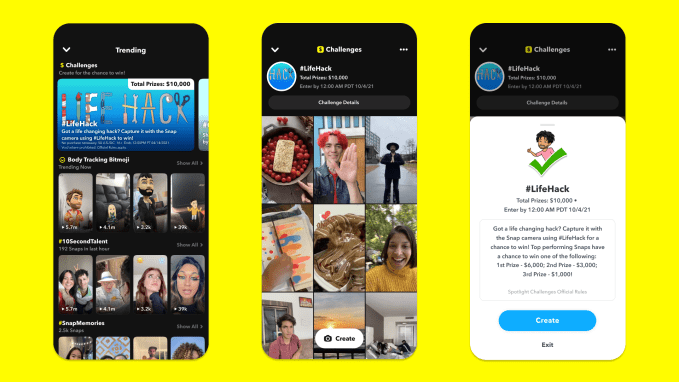
Image Credits: Snap
- Snap introduced a series of new tools, programs and features that will enable creators on its platform to generate revenue. These include the expansion of a Gifting feature to worldwide creators, the expansion of the Creator Marketplace to include Snap Stars (top creators with verified accounts), the launch of a how-to resource called the Creator Hub and a new way for Snapchat creators to be rewarded for making short-form video for its in-app TikTok rival, known as Spotlight. Separately, it launched a new tool to help encourage its young users to run for office.
- Snapchat launched new tools and educational resources aimed at preventing younger users from buying illegal drugs on its platform. The company said the goal of the new tools is to keep its users safe from “the devastating impacts of the fentanyl crisis.” Among the changes, Snap says it improved its proactive detection capabilities to remove drug dealers from its platform before they are able to engage with users. It also worked to improve its in-app reporting tools, and is adding a new educational portal when drug-related terms are searched for in the app.
- Instagram has largely replaced TikTok in India, following the ban, a report from Rest of World found. Instagram itself has 210 million active users there, who are uploading 6 million short videos daily. The largest local alternative is ShareChat’s Moj, with 2.5 million videos uploaded daily.
- Instagram ditched IGTV. The company will no longer refer to its long-form video content as “IGTV” and will instead merge IGTV and Instagram Feed videos into a new format called simply “Instagram Video.” It’s also rebranding the IGTV app as Instagram Video, which will include everything but Reels (short-form) as well as Live videos.
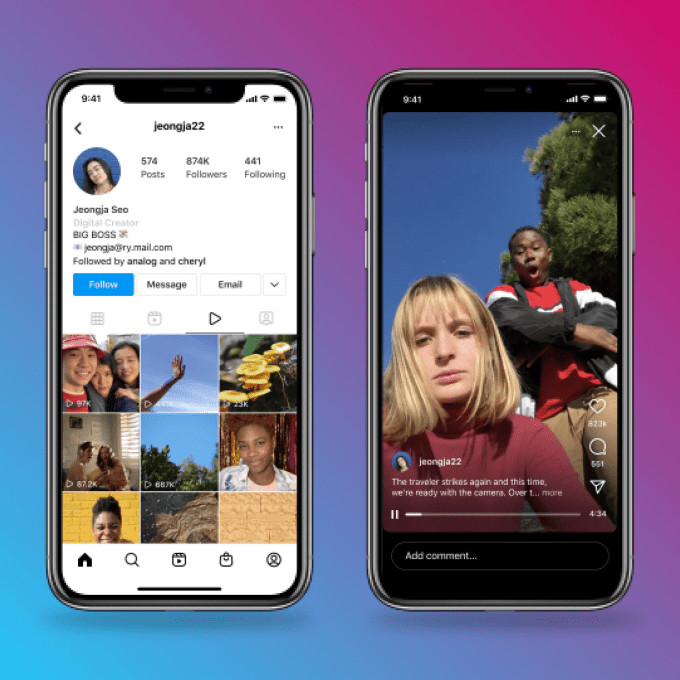
Image Credits: Instagram
- Twitter is testing a new prompt that will warn you when a conversation has “bad vibes.” The company said the idea is to give people a heads-up if they’re about to join a conversation that’s “heated or intense,” and hopes this will promote healthier conversations.
- Twitter is shutting down Scroll, the distraction-free reading service it acquired. It says the feature will become a part of its premium Twitter Blue subscription in the future. Scroll had partnered with publishers to offer fast-loading, ad-free articles.
Photos
- Google Photos app on Android has added the ability to edit and add metadata on photos and videos, something users have requested for a long time. The functionality was already available on iOS.
Messaging
- WhatsApp’s iOS beta added E2E encryption for backups. The feature is only available to select beta testers on TestFlight for the time being. The company announced last month it was preparing to bring E2E to chat backups on iCloud and Google Drive.
- Telegram says it gained a record 70 million new users during Facebook’s six-hour outage on Monday. The company said the growth may have led to some slower than normal speeds in the Americas during that time.
Streaming & Entertainment
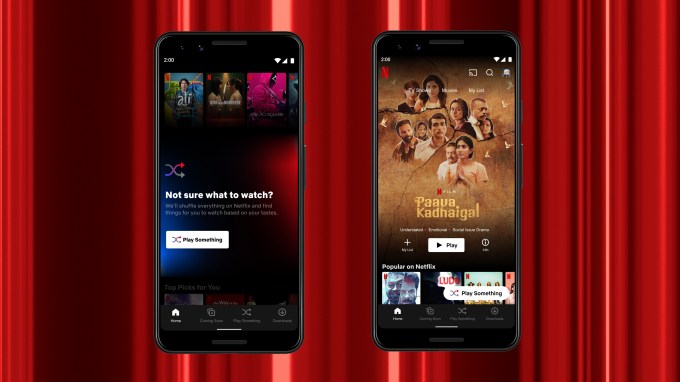
Image Credits: Netflix
- Netflix brought its Shuffle Mode feature, “Play Something,” to Android devices worldwide. The option will play another movie or show Netflix believes you may like, based on your interests and your prior viewing behavior. These selections may include a movie or show you’re already watching but haven’t completed, a movie or show on your watch list or a brand-new series or film that Netflix’s personalization algorithms suggest. The feature will later come to iOS.
- Netflix also snagged the top spot on the App Store this week, thanks to the popularity of its new hit series “Squid Game.” The app hasn’t been No. 1 since at least 2014.
- YouTube is investing in podcasts. The company is hiring an an executive to oversee its podcasting business — a new position, Bloomberg said. The platform already hosts a number of podcasts, including top shows like Joe Rogan and those from popular YouTubers, like Logan Paul.
- Spotify’s Anchor app, which provides podcasters with publishing tools, joined the Spotify Audience Network. The new audio ad marketplace puts Anchor’s creators in the reach of more advertisers and campaigns.
Gaming
- Viral hit game High Heels has topped 100 million downloads in less than a year, App Annie said. Zynga acquired the title when it purchased hyper-casual game maker Rollic in April. Launched in December 2020, the game was the No. 3 most downloaded hyper-casual game worldwide during H1 2021, and No. 6 among all games.
Dating
- Tinder will offer users in-app currency for keeping their profile active, according to Bloomberg. The virtual currency is rolling out in Australia first, before heading to other markets, like the U.S. It can be used to buy premium features like Super Likes and Boost.
Auto & Transportation
- Apple is said to be working on an expansion of CarPlay that would allow it to more directly interoperate with vehicle features, like the AC, seat adjustments and more, said Bloomberg.
- Google Maps launched eco-friendly routing in the U.S. The feature, which gives drivers the choice between the fastest and most fuel-efficient route, is now live for iOS and Android users in the U.S., with support in Europe launching in 2022.
Utilities
 Paddle, a solutions provider for subscription-based businesses, announced a new in-app purchasing (IAP) system aimed at iOS developers that’s designed to be a drop-in replacement for Apple’s own IAP. Paddle says its system will provide developers with access to customer data throughout their lifecycle; will offer a combination of direct subscription management and tools to pause subscriptions; and will support other payment mechanisms, like PayPal. It will also allow developers to manage their own refunds. Plus, its fees would be 10% on transactions under $10 and 5% on transactions over $10 — less than Apple. But Paddle’s entire product hinges on its belief that the court’s ruling in the Epic v. Apple lawsuit will be held up upon appeal, and that the way Apple will interpret the ruling will allow payment system alternatives such as Paddle’s to operate. That’s not something Paddle at this point could definitively know.
Paddle, a solutions provider for subscription-based businesses, announced a new in-app purchasing (IAP) system aimed at iOS developers that’s designed to be a drop-in replacement for Apple’s own IAP. Paddle says its system will provide developers with access to customer data throughout their lifecycle; will offer a combination of direct subscription management and tools to pause subscriptions; and will support other payment mechanisms, like PayPal. It will also allow developers to manage their own refunds. Plus, its fees would be 10% on transactions under $10 and 5% on transactions over $10 — less than Apple. But Paddle’s entire product hinges on its belief that the court’s ruling in the Epic v. Apple lawsuit will be held up upon appeal, and that the way Apple will interpret the ruling will allow payment system alternatives such as Paddle’s to operate. That’s not something Paddle at this point could definitively know.- Amazon added a new speech setting to the Alexa app on iOS and Android that will force Alexa to wait for a longer period of time for a person to finish speaking. The feature is opt-in and could make the app useful to those with a speech impairment.
- Firefox Focus, the privacy-centric browser, was updated this week with a brand-new look, shortcuts and more privacy controls. The browser now has new colors, a new logo and a dark theme, as well. Users can now also create and add a new password that can be saved directly in the browser, then used across mobile and desktop.
- Universe, a mobile website builder app, added advanced creative controls, enhanced themes, block features and more to its grid-based web builder.
Government & Policy
- Dutch antitrust authority found that Apple’s rule requiring developers to use its in-app payments system is anticompetitive, Reuters reported. The investigation began in 2019, following complaints from Match, which said Apple hindered it from direct communications with developers.
- The U.K.’s comms, broadcast and, now, internet regulator, Ofcom, said video-sharing platforms in the U.K. will have to comply with new regulations designed to protect those under the age of 18 from harmful content. This includes hate speech, videos or ads likely to incite violence in protected groups, terrorist content, child sex abuse material, racism and xenophobia. In addition to larger video platforms like TikTok, Vimeo, Twitch, Snap, Triller and more, the regulations also apply to services like OnlyFans, Recast, BitChute and others.
Funding and M&A
 Mark Cuban-backed fintech Otto raised $4.5 million in seed funding led by Uncommon Capital. The app lets users tap into their vehicle’s equity for access to credit, allowing them to borrow at rates similar to a standard credit card. Title loans are typically predatory, and Otto is offering a slightly improved alternative, but by structuring this as credit, not a loan, users who make timely payments will be able to build or improve their credit, even if they were not qualified for other credit cards.
Mark Cuban-backed fintech Otto raised $4.5 million in seed funding led by Uncommon Capital. The app lets users tap into their vehicle’s equity for access to credit, allowing them to borrow at rates similar to a standard credit card. Title loans are typically predatory, and Otto is offering a slightly improved alternative, but by structuring this as credit, not a loan, users who make timely payments will be able to build or improve their credit, even if they were not qualified for other credit cards.
 Twitter sold mobile ad platform MoPub to marketing software maker AppLovin for $1.05 billion in cash. MoPub helped Twitter generate $188 million in revenue in 2020, but Twitter is now more focused on developing its own owned and operated ad product instead, in addition to the revenue generation it has planned from its other new features like live audio rooms, subscriptions, creator tools and more.
Twitter sold mobile ad platform MoPub to marketing software maker AppLovin for $1.05 billion in cash. MoPub helped Twitter generate $188 million in revenue in 2020, but Twitter is now more focused on developing its own owned and operated ad product instead, in addition to the revenue generation it has planned from its other new features like live audio rooms, subscriptions, creator tools and more.
 Facemoji, which makes a plug-and-play tech platform for adding avatar systems to mobile apps, raised $3 million in seed funding, led by Play Ventures. Twitter, which more rarely makes corporate investments, and Roosh Ventures also participated.
Facemoji, which makes a plug-and-play tech platform for adding avatar systems to mobile apps, raised $3 million in seed funding, led by Play Ventures. Twitter, which more rarely makes corporate investments, and Roosh Ventures also participated.
 German digital insurance tech firm Getsafe raised $93 million in Series B funding for its app that allows customers to buy, manage and change their insurance policies and file claims. The app offers liability and contents insurance, car insurance, legal insurance and newly added dental insurance. Investors include Abacon Capital, Earlybird, CommerzVentures and Swiss Re.
German digital insurance tech firm Getsafe raised $93 million in Series B funding for its app that allows customers to buy, manage and change their insurance policies and file claims. The app offers liability and contents insurance, car insurance, legal insurance and newly added dental insurance. Investors include Abacon Capital, Earlybird, CommerzVentures and Swiss Re.
 Copper Banking raised $9 million in seed funding for its digital banking service aimed at teens, which incorporates financial educations into its product offering. Investors include PSL Ventures, an arm of Pioneer Square Labs, as well as Clocktower Ventures, Index Ventures Scout Fund, Launchpad Capital, Financial Venture Studio, Maven Ventures, Fiat Ventures and Arnold Ventures.
Copper Banking raised $9 million in seed funding for its digital banking service aimed at teens, which incorporates financial educations into its product offering. Investors include PSL Ventures, an arm of Pioneer Square Labs, as well as Clocktower Ventures, Index Ventures Scout Fund, Launchpad Capital, Financial Venture Studio, Maven Ventures, Fiat Ventures and Arnold Ventures.
 Singapore-based Grab raised its stake in the Indonesian mobile wallet provider Ovo to around 90%, up from 39%, by acquiring stakes that were owned by PT Tokopedia and Lippo Group, a filing indicated.
Singapore-based Grab raised its stake in the Indonesian mobile wallet provider Ovo to around 90%, up from 39%, by acquiring stakes that were owned by PT Tokopedia and Lippo Group, a filing indicated.
 Matter raised a $7 million Series A led by GV to build a better reading app for the era of alternative media, newsletters and audio consumption of news and information. The app aims to compete with services like Instapaper and Pocket by offering a modern alternative.
Matter raised a $7 million Series A led by GV to build a better reading app for the era of alternative media, newsletters and audio consumption of news and information. The app aims to compete with services like Instapaper and Pocket by offering a modern alternative.
 Indonesian stock-trading app Ajaib raised $153 million in Series B funding led by DST Global, the same firm that backed Robinhood. Founded by Stanford MBA classmates, the app — now a unicorn — targets young, retail investors who are starting to trade online for the first time. Other investors in the round include Ribbit Capital, IVP, ICONIQ Capital, Insignia Ventures, Alpha JWC Ventures, SoftBank Ventures and Li Ka-shing’s Horizons Ventures.
Indonesian stock-trading app Ajaib raised $153 million in Series B funding led by DST Global, the same firm that backed Robinhood. Founded by Stanford MBA classmates, the app — now a unicorn — targets young, retail investors who are starting to trade online for the first time. Other investors in the round include Ribbit Capital, IVP, ICONIQ Capital, Insignia Ventures, Alpha JWC Ventures, SoftBank Ventures and Li Ka-shing’s Horizons Ventures.
 Upmesh, a service created to help automate checkout from Facebook Live streams, including on mobile, raised $3 million in seed funding led by Leo Capital. The company is preparing to build its own app that will allow users to discover new live commerce sellers across social media platforms.
Upmesh, a service created to help automate checkout from Facebook Live streams, including on mobile, raised $3 million in seed funding led by Leo Capital. The company is preparing to build its own app that will allow users to discover new live commerce sellers across social media platforms.
 Ladder, a life insurance startup that works via an app, raised $100 million in a new round of funding co-led by Thomvest Ventures and OMERS Growth Equity. The company is on track to issue $30 billion worth of coverage by the end of 2021, and saw its revenue grow 4.5x over the past year.
Ladder, a life insurance startup that works via an app, raised $100 million in a new round of funding co-led by Thomvest Ventures and OMERS Growth Equity. The company is on track to issue $30 billion worth of coverage by the end of 2021, and saw its revenue grow 4.5x over the past year.
Downloads
Matter
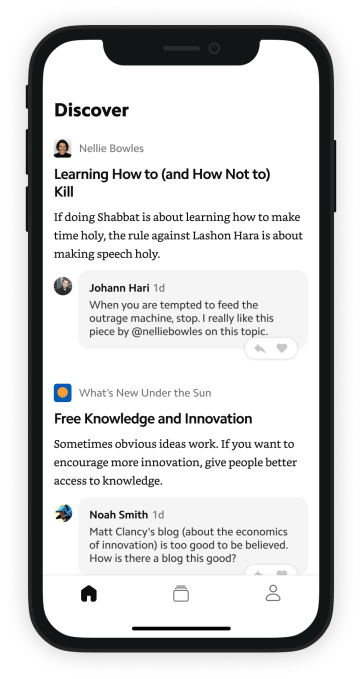
Image Credits: Matter
A new app called Matter is offering a better reading app that works with how people today consume news and information. Instead of just marking articles to save later, only to never get read, Matter spruces up the reading list experience by offering other features to keep users more engaged with what they’re reading — like private and public highlighting, support for commenting, a curated public feed and editors picks, support for importing newsletters, audio playback of articles in a less-robotic sounding voice than rivals, and more. Users can find and follow others on Matter, which curates its content based on tweets from top thinkers as well as what its community publicly shares. The app is currently iOS only, but is developing a web and Android version in the future.
Fireside

Image Credits: Fireside
A new startup called Fireside launched this week with what it hopes will be a more compelling set of tools for content creation, distribution, measurement and monetization. The service offers a platform for live and interactive shows, which had earlier drawn Clubhouse comparisons. But Fireside offers live and on-demand programming as well as the ability to export and simulcast to other platforms. The app had been making waves during its beta period thanks to financial backing by Mark Cuban, who has also taken the rare step of naming himself as co-founder. He’s joined by former Googler, YouTuber and Node co-founder Falon Fatemi, who sold her last company to SugarCRM, and early Yammer employee Mike Ihbe. The platform is now exiting its beta period, where it was tested with more than 500 creators whose collective audience reach has topped 100 million, the company says. Fireside is available on the web and iOS to start. (Read the full review here on TechCrunch.)
Welcome
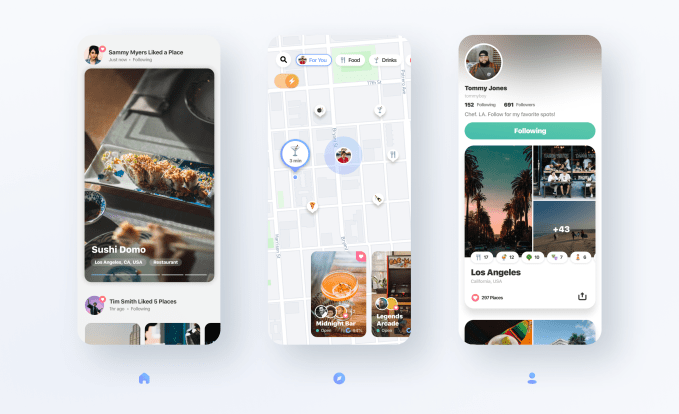
Image Credits: Welcome
When you’re exploring a city — whether one you’re visiting on your travels or your own — there are a number of tools that can help you find out where to go, what to see and what to do, like Google Maps, Yelp, TripAdvisor and others. But a startup called Welcome thinks that today’s set of tools could be smarter and more personalized to the individuals who use them. Its new app instead uses “real-time” technologies to make recommendations that take into account a user’s preferences as well as other details about their current context — like the weather, season, traffic and the popularity of the place at the current time of day — in order to provide a better-curated set of recommendations. The end result is a city guide that functions more like a personal concierge. (Read the full review here on TechCrunch.)
Halide 2.5 (Update)

Image Credits: Halide
With the iPhone 13 Pro, users can now take photos close up — less than an inch away from their subject — thanks to its support for macro photography. But now, there’s an option for everyone else, too. Halide’s popular camera app updated this week with a new feature that brings support for macro photography to all iPhone models from the iPhone 8 and up. While the ultra-wide camera will still automatically focus on very-close subjects, the company says, a separate mode unlocks powerful tools and processing specific to macro. To get started, you’ll tap the “AF” button to switch from auto focus to manual focus. To then enter Macro Mode, you’ll tap the flower icon — the universal symbol for macro. Halide will examine your available cameras and switch to whichever one has the shortest minimum focus distance. It then locks focus at that nearest point. You can tap anywhere on-screen to adjust focus or adjust it manually. To make the feature work, it trained a neural network to upscale images in a way that produces “much sharper, smoother results” than what you typically get in an editor, the company said.
via Tech News Flow

No comments:
Post a Comment